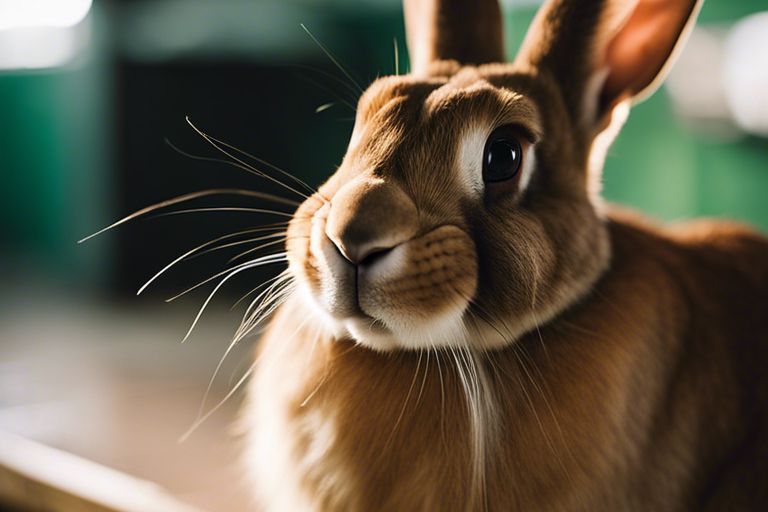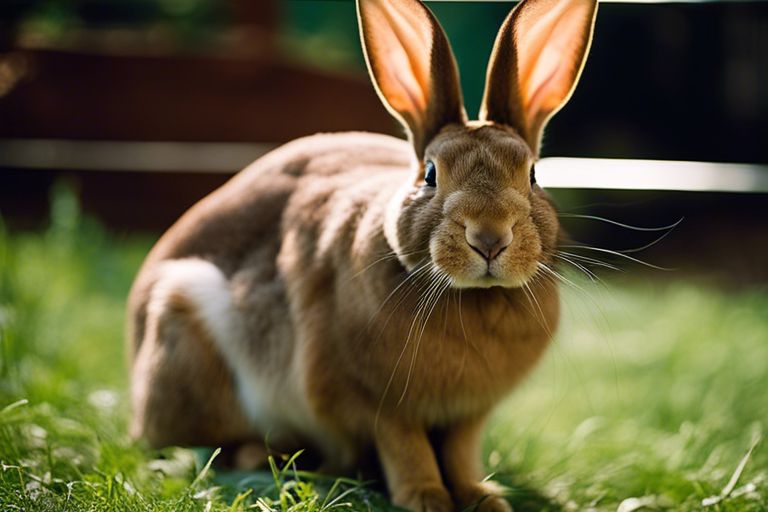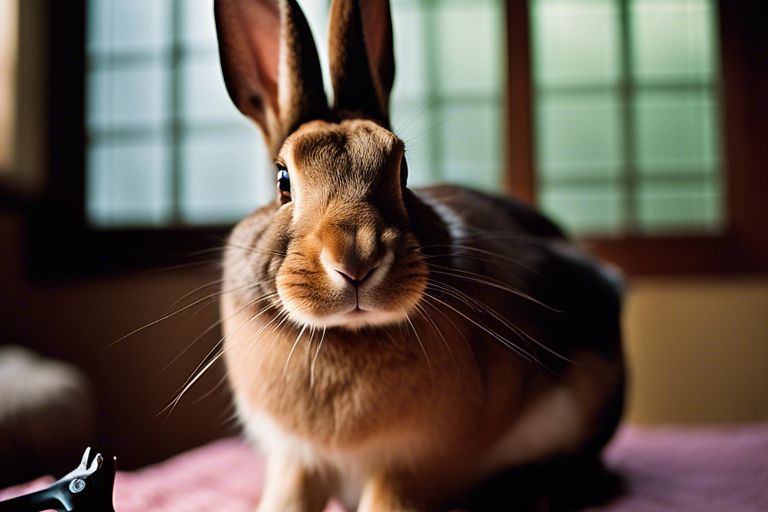Oftentimes, rabbit owners may not be aware of the impact excessive grooming can have on the health and well-being of their Flemish Giants. Grooming-related stress can lead to a host of physical and behavioral symptoms in these gentle giants. It is essential for rabbit owners to be vigilant and recognize the critical signs of grooming-related stress in order to provide the necessary care for their beloved pets. In this informative blog post, we will explore the key symptoms that indicate grooming-related stress in Flemish Giants and offer insights on how to address and prevent this issue.
Key Takeaways:
- Changes in Behavior: Look for changes in behavior such as excessive grooming, restlessness, or agitation in Flemish Giants, as these can be symptoms of grooming-related stress.
- Physical Signs: Pay attention to physical signs of stress including hair loss, skin irritation, or sores from excessive grooming in Flemish Giants.
- Environmental Factors: Consider the environment and potential stressors such as lack of space, constant noise, or conflict with other rabbits that may contribute to grooming-related stress in Flemish Giants.
- Veterinary Consultation: If you suspect grooming-related stress in your Flemish Giant, it’s important to seek veterinary advice to rule out any underlying health issues and to discuss potential behavior modification or environmental changes.
- Enrichment and Socialization: Providing appropriate enrichment and opportunities for socialization can help alleviate grooming-related stress in Flemish Giants, as it can provide mental stimulation and positive social interactions.

Identifying Grooming-Related Stress
Obviously, identifying grooming-related stress in Flemish Giants is crucial for their well-being and overall health. By understanding the symptoms and being able to recognize them, rabbit owners can take the necessary steps to alleviate the stress and provide a comfortable environment for their pets.
Behavioral Symptoms
Any sudden changes in behavior such as aggression, withdrawal, or excessive grooming can be indicators of grooming-related stress in Flemish Giants. Changes in eating or drinking habits, restlessness, and excessive thumping can also be signs that your rabbit is experiencing stress due to grooming-related issues.
Physical Symptoms
Identifying physical symptoms of grooming-related stress in Flemish Giants is essential for early intervention. Signs such as hair loss, overgrown nails, skin irritation, and even injuries from excessive grooming can be indications that your rabbit is under stress related to grooming.
Physical symptoms such as reduced weight or unexplained wounds should be carefully monitored and addressed promptly to ensure the well-being of your Flemish Giant.
Factors Contributing to Stress
Any rabbit can experience stress from grooming-related activities. There are several factors that can contribute to this, including the frequency of grooming sessions, grooming environment and equipment, and the individual rabbit’s personality and past experiences. It is important to be aware of these factors in order to minimize the risk of stress in your Flemish Giant.
- Frequency of grooming sessions
- Grooming environment and equipment
- Individual rabbit’s personality and past experiences
Assume that Rabbit body language can also provide important clues about the stress level in your Flemish Giant.
Frequency of Grooming Sessions
Any rabbit can become stressed if they are subjected to excessive grooming sessions. Over-grooming can lead to physical discomfort and anxiety in Flemish Giants. It is important to establish a regular grooming routine that balances proper care with the rabbit’s comfort and tolerance levels.
Grooming Environment and Equipment
Grooming tools and environment play a crucial role in determining the stress level in your Flemish Giant. Harsh or uncomfortable grooming equipment can cause distress, while an unclean or chaotic grooming environment can create anxiety. It is essential to create a calm and comfortable grooming environment and use gentle, appropriate grooming tools to minimize stress.
Sessions should be conducted in a quiet, familiar space, using soft brushes and gentle handling techniques to ensure the comfort and well-being of your Flemish Giant. Consistency and patience in grooming practices are key to building a positive association and minimizing stress during grooming sessions.
Managing and Reducing Stress
To effectively manage and reduce grooming-related stress in Flemish Giants, it is important to implement best practices in grooming and utilize stress mitigation techniques. By incorporating these strategies, rabbit owners can ensure the well-being and comfort of their beloved pets.
Best Practices in Grooming Flemish Giants
An essential best practice in grooming Flemish Giants is to handle them with gentleness and patience. Use a soft brush to gently remove loose fur, and trim their nails carefully to avoid causing them any discomfort. Additionally, create a soothing grooming environment by minimizing loud noises and distractions to help your rabbit feel as calm as possible during grooming sessions.
Stress Mitigation Techniques
Giants benefit from various stress mitigation techniques such as providing them with a quiet and secure grooming area. This allows them to feel safe and relaxed during the grooming process. Another effective technique is to establish a consistent grooming routine, as rabbits thrive on predictability and routine.
To further help Flemish Giants cope with grooming-related stress, it is important to communicate calmly and reassuringly with them throughout the grooming process. This can help to alleviate their anxiety and build trust, ultimately reducing their stress levels.

Conclusion
Now that we have discussed the symptoms of grooming-related stress in Flemish Giants, it is important to remain vigilant and observant of these signs in our rabbits. By recognizing the symptoms such as excessive licking, hair loss, skin irritation, and behavior changes, we can address the underlying stressors and provide appropriate care for our furry companions. Grooming-related stress can have significant impacts on the health and well-being of Flemish Giants, so it is crucial to take the necessary steps to minimize and alleviate their stress levels. Through diligent monitoring and proactive intervention, we can ensure the happiness and comfort of our beloved pets.
FAQ
Q: What are the symptoms of grooming-related stress in Flemish Giants?
A: Some symptoms of grooming-related stress in Flemish Giants include excessive licking or chewing of their fur, skin irritation or redness, hair loss, and behavioral changes such as aggression or withdrawal.
Q: How can I help my Flemish Giant if they are experiencing grooming-related stress?
A: If you suspect your Flemish Giant is experiencing grooming-related stress, it’s important to consult with a veterinarian to rule out any underlying health issues. Additionally, provide a clean and comfortable living environment, offer enriching activities to reduce boredom, and maintain a regular grooming routine to help alleviate stress.
Q: Are there any preventative measures I can take to reduce the risk of grooming-related stress in my Flemish Giant?
A: Yes, you can prevent grooming-related stress in Flemish Giants by providing a healthy diet to promote proper coat and skin health, keeping their living environment clean and free of parasites, and giving them regular exercise and mental stimulation to reduce anxiety and stress. Additionally, establishing a positive and consistent grooming routine from an early age can help desensitize them to the process and reduce the likelihood of stress-related grooming behaviors.
